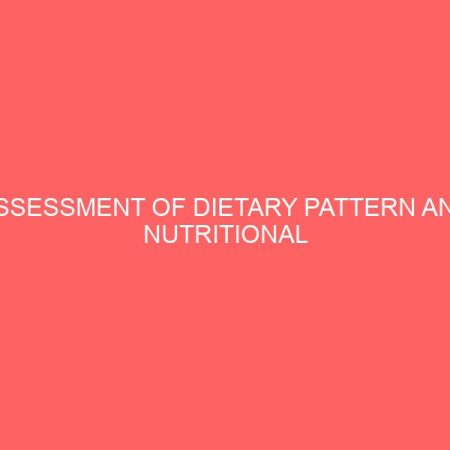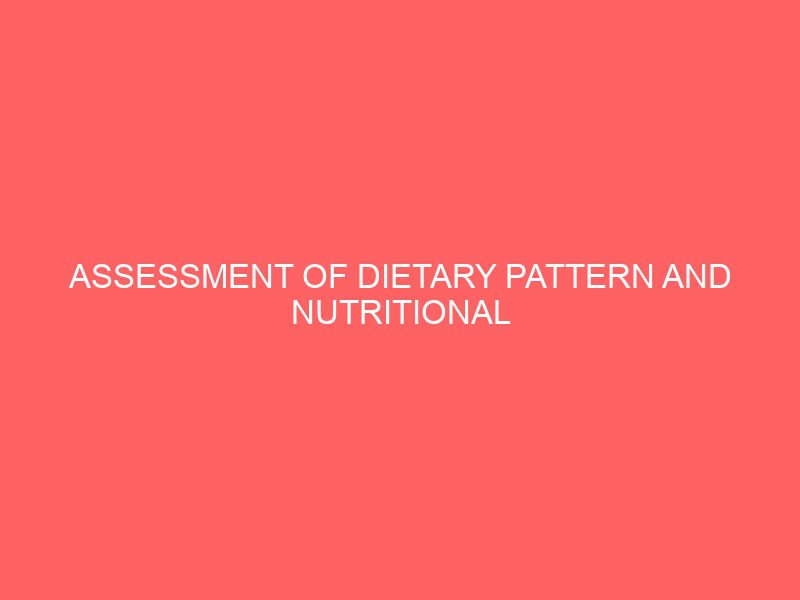Description
CHAPTER ONE
1.1 INTRODUCTION
This project is on assessment of dietary pattern and nutritional status of people living with hiv/aids attending some voluntary and counselling test (vct) units in kaduna metropolis.
Acquired Immune Deficiency Syndrome, popularly known as AIDS, is caused by the virus, Human Immuno-deficiency Virus (HIV). This is a tiny germ that is invisible to the eye that attacks the immune system of the body. AIDS is a condition in which the virus damages the body immune system and renders it helpless against any infection, (Hawkes et al., 2002). According to the World Health Organization (2005), AIDS is the most dreaded, most feared and the most talked about disease in the world today.It is a deadly disease that has no cure. According to Ojedokun (2004), there are two main sub types: HIV I and HIV II. HIV I is the most common type all over the world while HIV II is only common in West Africa. The intensity and the pattern with which HIV/AIDS affects nutritional status are very much different from that in other infections and in ordinary case of inadequate nutrients intake (Piwoz and Preble, 2000). Due to lack of cure for HIV/AIDS, the immune system of infected patients is under constant exposure to infections which adversely affect the nutritional status and immune competence of the subjects in question (Piwoz and Preble, 2000).
Malnutrition is a serious danger for people living with HIV/AIDS. Even at the early stages of HIV infection when no symptoms are apparent, HIV makes demands on the body‘s nutritional status (Walsh et al., 2003),the risk of malnutrition increases significantly during the course of the infection. Good nutrition cannot cure AIDS or prevent HIV infection, but it can help to maintain and improve the nutritional status of a person with HIV/AIDS and delay the progression from HIV to AIDS-related diseases (Piwoz and Preble, 2000). It can therefore improve the quality of life of people living with HIV/AIDS. Nutritional care and support are important from the early stages of the infection to prevent the development of nutritional deficiencies. A healthy and balanced diet will help to maintain body weight and fitness. Eating well helps to maintain and improve the performance of the immune system the body‘s protection against infection – and therefore helps a person to stay healthy (Bartlett, 2003). Many of the conditions associated with HIV/AIDS affect food intake, digestion and absorption, while others influence the functions of the body (Bartlett, 2003). Many of the symptoms of these conditions (e.g. diarrhoea, weight loss, mouth and throat sores, nausea or vomiting) are manageable with appropriate nutrition. Good nutrition will complement and reinforce the effect of any medication taken.
In Kaduna state, there are few data on the micronutrient status, lipid profile, prevalence of underweight and overweight among PLWHA. Hence, there is a need to study their nutritional status.
1.2 STATEMENT OF PROBLEMS
Although weight loss and wasting remain common in HIV infection, nutrition related problems such as obesity, diabetes, hyperlipideamia and hypertension also increasingly affect people living with HIV (Piwoz and Preble, 2000). A shift in causes of death from acute opportunistic infections to other causes such as cardiovascular diseases, diabetes and obesity indicates the need for a more comprehensive approach to healthy nutrition for persons infected with HIV (Walsh et al., 2003).
Research has also revealed that micronutrients can modify the course of viral infection and restore the functionality of the immune system (Jariwalla et al., 2011).Studies conducted with both single and multiple nutritional supplements have shown that micronutrients act to control HIV/AIDS by; suppression of virus multiplication and spread, restoration of cell-mediated immune responses and, slowing the rate of progression and reducing the severity of AIDS(Jariwalla et al., 2011).
1.3 JUSTIFICATION
There are many publications on the epidemiology of the HIV/AIDS and the factors fuelling the epidemic in Nigeria, but there is paucity of data on the nutritional status of people diagnosed with HIV/AIDS. Assessment of nutrition and medical status is crucial to quality nutrition care for every person living with HIV; therefore, there is a need to carry out a comprehensive study on the dietary pattern, biochemical parameters, anthropometric characteristics and micronutrient status for quality nutrition care for persons living with HIV in Kaduna metropolis.
1.4 AIM AND OBJECTIVES
1.4.1 Aim
To investigate the dietary pattern and nutritional status of People Living with HIV/AIDS (PLWHA) attending voluntary and counseling test (VCT) units of some Hospitals in Kaduna metropolis.
1.4.2 Specific objectives
The specific objectives of the study are:
- To assess the socio-economic and demographic characteristics of People Living with HIV/AIDS attending voluntary and counseling test units in Kaduna metropolis.
- To determine the anthropometric characteristics of People Living with HIV/AIDS attending voluntary and counseling test units in Kaduna metropolis.
- To assess some biochemical parameters of People Living with HIV/AIDS attending voluntary and counseling test units in Kaduna metropolis.
- To correlate the micronutrient status with some biochemical parameters of People Living with HIV/AIDS attending voluntary and counseling test units in Kaduna metropolis.
- To determine the dietary pattern of People Living with HIV/AIDS attending voluntary and counseling test units in Kaduna metropolis.







